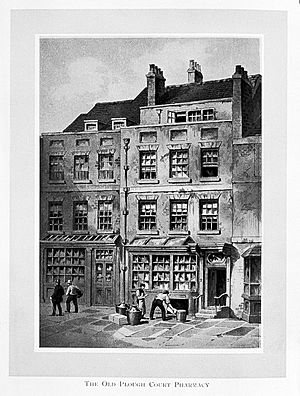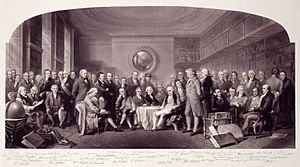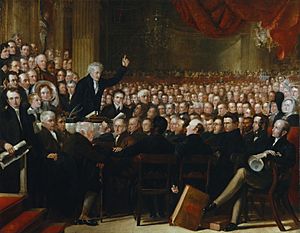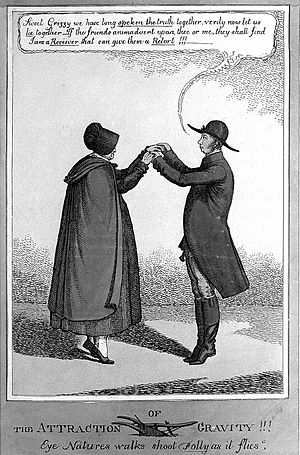William Allen (English Quaker) facts for kids
Quick facts for kids
William Allen
|
|
|---|---|
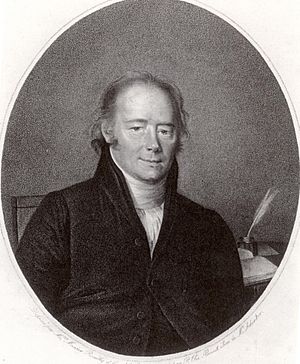 |
|
| Born | 29 August 1770 Spitalfields, London, England
|
| Died | 30 September 1843 (aged 73) Stoke Newington, London, England
|
| Movement | abolitionist Quakers |
William Allen (born August 29, 1770 – died September 30, 1843) was an English scientist and a kind person who helped others. He was a Quaker, a member of a Christian group known for its simple lifestyle and peaceful beliefs. William Allen was strongly against slavery and worked hard to make society better, especially for people in prison, during the early 1800s in England.
Contents
Early Life and Science Journey
William Allen was born in 1770 in London. He was the oldest son in a Quaker family. His father, Job Allen, made silk. William went to a Quaker school in Rochester, Kent. After school, he worked in his father's business.
When he was a young man in the 1790s, William became very interested in science. He went to many science meetings and lectures at hospitals. He even joined the Chemical Society at Guy's Hospital. When his father passed away, William decided to focus on his own career in pharmacy, which is about making and selling medicines.
In 1795, William took over a chemical business called Plough Court. He became a Fellow of the Linnean Society in 1802, which is a group for people who study nature. He also taught chemistry at Guy's Hospital. A year later, he became the president of the Physical Society there. Famous scientists like Humphry Davy and John Dalton suggested him for a teaching job at the Royal Institution, another important science center.
In 1807, William Allen's own research on carbon helped him become a Fellow of the Royal Society. This was a big deal because it connected him with the top scientists of his time. He worked closely with Humphry Davy and his friend Luke Howard.
A Pharmacist and Innovator
William Allen was well-known for his pharmacy business at 2 Plough Court in London. He partnered with Samuel Mildred in 1795. Later, in 1797, he brought in his friend Luke Howard as a partner. This company eventually became Allen & Hanburys, a very successful pharmaceutical business. It was bought by GlaxoSmithKline in 1958, but the name Allen & Hanburys is still used for some products.
William made sure his company had strong ties with medical places, especially Guy's Hospital. He used Plough Court for meetings of the Askesian Society, a group he helped start. Here, scientists like Luke Howard and others could share new ideas and experiments. They even opened a second lab in Plaistow to create new chemicals.
In 1841, William Allen helped create a professional group for pharmacists. He co-founded The Pharmaceutical Society, which later became The Royal Pharmaceutical Society. He was its very first president!
Fighting Against Slavery
When William Allen was a teenager, he learned about the terrible Atlantic slave trade. Influenced by other Quakers who opposed slavery, he stopped eating sugar until 1834 as a protest. He became deeply involved in the fight against slavery in the early 1790s. In 1792, he gave a speech about it, which was later published as a pamphlet.
In 1805, William Allen joined the committee of the Society for the Abolition of the Slave Trade. This group was strongly influenced by Quakers. Many of its founders were Quakers, including some who lived near William Allen in Stoke Newington.
The most famous member of this society was William Wilberforce. Unlike the Quakers, he was an Anglican and could be elected to the House of Commons. Wilberforce visited William Allen often, as he was the group's voice in Parliament.
William Allen also helped start the African Institution. This group worked to set up a colony in West Africa for enslaved people who had been freed in America. This work began in 1808, after the British Parliament passed a law in 1807 to stop the slave trade.
William Allen continued to fight for the end of slavery until he died. In the 1830s, he worked hard to make sure all African-Caribbean people were completely free by August 1, 1838. In 1839, he became a founding member of the British and Foreign Anti-slavery Society. He helped organize the world's first anti-slavery convention in London in 1840. This important event was captured in a famous painting by Benjamin Haydon, which you can see in the National Portrait Gallery in London.
A Champion of Peace
William Allen believed strongly in peace. In 1798, he wrote in his diary about a book that argued against war based on Christian ideas. In 1811, he started a publication called The Philanthropist, which printed articles about peace.
After the Napoleonic Wars ended, a Peace Committee met at William Allen's house in London in 1814. They wanted to create a "peace association." In 1816, William Allen became a founding member of the Society for the Promotion of Permanent and Universal Peace, after another meeting at his home. He hoped that leaders in Europe would work together to keep the peace.
Other Ways William Allen Helped Others
William Allen's desire to help people came from his religious beliefs. In 1814, he became a partner in New Lanark, a famous model community. He also worked to improve prisons. In 1808, he started a society to spread knowledge about how to improve prison conditions.
Helping with Food and Self-Sufficiency
In 1798, William Allen set up a "Soup Society" in London to help feed people. He also experimented with farming to find ways to improve food and diets for ordinary people. He did trials on small plots of land and later used his findings to help create a model farming settlement called Lindfield.
William Allen wrote a pamphlet called Colonies at Home. In it, he suggested that instead of sending people to colonies far away, money should be used to create self-sufficient communities at home. This would help people grow their own food and become more independent.
Improving Education for All
William Allen helped fund the ideas of Joseph Lancaster, who had a system where older students helped teach younger ones. In 1808, William Allen and others started a society to promote this system. By 1810, William became the treasurer of this society, which aimed to open new schools in England and other countries.
In 1824, William Allen founded the Newington Academy for Girls, a Quaker school. At that time, girls often had limited chances for education. This school offered many subjects, including new sciences like astronomy, physics, and chemistry, which William taught himself! He even hired a famous poet, Ugo Foscolo, to teach Italian. The school was special because it used the world's first school bus to take students to their meeting house on Sundays.
Travels and Sharing Ideas
From 1818 to 1820, William Allen traveled around Europe with a Quaker preacher named Stephen Grellet. They visited Norway in 1818. After his third wife passed away, William traveled even more. For example, in 1840, he spent five months in Europe with Elizabeth Fry, another famous Quaker who worked to improve prisons.
Family Life
William Allen married Mary Hamilton in 1796. They had a daughter, also named Mary. Sadly, his wife Mary died just two days after their daughter was born.
In 1806, William married Charlotte Hanbury. They traveled to Europe in 1816, but Charlotte died during their trip. William then raised his teenage daughter, Mary. In 1823, his daughter Mary had a son, but she also died nine days later.
William Allen married for a third time in 1827 to Grizell Hoare. Grizell was the older sister of Samuel Hoare Jr, one of the founders of the Society for the Abolition of the Slave Trade. She was a wealthy widow and had helped fund the Newington Academy for Girls. She was 72 when they married. Their marriage was even made fun of in a cartoon!
Grizell Allen died in 1835.
Death and Legacy
William Allen passed away on September 30, 1843. He was buried in Stoke Newington, London, in the grounds of the Quaker Meeting House. Today, part of that land is a park. William Allen is remembered as a dedicated scientist and a kind person who worked tirelessly to make the world a better place for everyone.
Images for kids
 | Anna J. Cooper |
 | Mary McLeod Bethune |
 | Lillie Mae Bradford |


